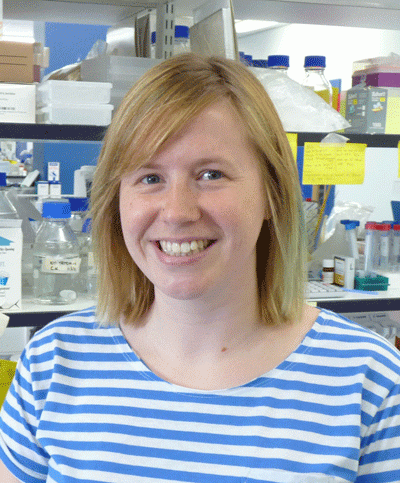
Ganley Lab stop the ‘ULK
Autophagy is a cell protective pathway that delivers unwanted, damaged or toxic components to the lysosome for degradation and recycling. It essentially prevents the cell from becoming a junkyard. Under most circumstances autophagy is a very beneficial intracellular pathway, however in cancer the situation is more complicated. In tumour cells autophagy is still thought to act in a protective manner, helping the cancer cells to survive the harsh conditions of tumourigenesis and the damage caused by chemotherapy. Therefore inhibiting autophagy in tumour cells is thought to be a promising approach to treat cancer. Unfortunately, there are currently no specific small molecule inhibitors of autophagy to test this hypothesis.
ULK1 is a serine/threonine protein kinase that is essential for autophagy induction. Katy Petherick and Owen Conway, a postdoc and undergraduate student in the Ganley Lab, together with collaborators from MRC Technology, investigated whether ULK1 could be targeted to block autophagy. They found that two compounds, MRT67307 and MRT68921, potently inhibited ULK kinase activity in vitro and blocked autophagy in cells. Importantly, Katy was able to engineer a drug-resistant ULK1 mutant that rendered cells insensitive to inhibitor treatment. This proved for the first time that autophagy can be blocked in cells by specifically targeting ULK1 with a drug.
The study provides a vital step in validating ULK and autophagy inhibition as a potential treatment for cancer. To read a copy of Katy's paper that is currently in-press, click
ULK1 is a serine/threonine protein kinase that is essential for autophagy induction. Katy Petherick and Owen Conway, a postdoc and undergraduate student in the Ganley Lab, together with collaborators from MRC Technology, investigated whether ULK1 could be targeted to block autophagy. They found that two compounds, MRT67307 and MRT68921, potently inhibited ULK kinase activity in vitro and blocked autophagy in cells. Importantly, Katy was able to engineer a drug-resistant ULK1 mutant that rendered cells insensitive to inhibitor treatment. This proved for the first time that autophagy can be blocked in cells by specifically targeting ULK1 with a drug.
The study provides a vital step in validating ULK and autophagy inhibition as a potential treatment for cancer. To read a copy of Katy's paper that is currently in-press, click

